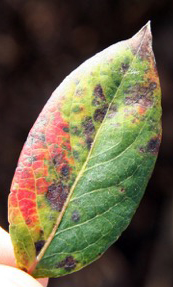By Clint Thompson
Leaf rust disease has always been a problem for Florida blueberry growers. But that concern has only magnified with producers transferring to an evergreen production system.

Credit: P. Harmon, UF/IFAS
Phil Harmon, professor and Extension plant pathologist at the University of Florida Institute of Food and Agricultural Sciences (UF/IFAS), discusses the issue growers are facing with this familiar problem.
“Here recently, Florida growers have switched into an evergreen system for the majority of our production. Rusts are obligate to their hosts, meaning that they have to be on their hosts to survive. Switching to an evergreen production means that we have leaves year-round, and the rust fungus survives better; there’s more of it and it causes a bigger problem,” Harmon said.
“While we have good tools as far as fungicides to control rust, we have an extended window now of nine or 10 months when this disease can occur. The issue becomes being able to afford and legally having enough applications to keep our leaves healthy to produce our crop for the next year. That’s where growers are running into issues with controlling this disease.”
Plants do not go dormant in an evergreen system and are managed to retain their leaves from the previous year through harvest the following spring in order to support early flowering and fruit set, according to UF/IFAS.
Fungicides are allowed a certain number of applications per year. If growers exceed and go off label, it becomes an illegal application. Harmon estimates sprays are applied every 2 to 3 weeks. But a grower would have to apply between 16 and 18 applications in an evergreen system which is not feasible.
“One, we don’t want to use that much fungicide; and two, even if we didn’t want to, it’s expensive and there are no products that are efficacious for rust that would allow that many applications to go out. We’re having to come up with rotations and trying to determine when the most important periods in the year to use the products to help with our production and fruit quality. Be more efficient with how we use our fungicides,” Harmon said.
“We know we have severe problems in evergreen production in the fall and winter which is different from what we’ve seen in the past. Generally, it’s considered a late harvest through early summer problem. Then we don’t really pay much attention to it in the fall when our leaves are defoliated because of our normal cropping system. Now, we’re focusing on late fall and early winter applications in South Florida to try to keep healthy leaves on the bush for flower bud initiation, flower bud bloom and early leaf set.”









